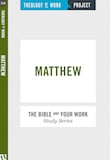Conclusion to Matthew
Bible Commentary / Produced by TOW Project
God cares about our work, and the Scriptures have much to say about this. As noted at the beginning, the Gospel according to Matthew addresses the theology and practice of work on many fronts: leadership and authority, power and influence, business practices, truth and deception, treatment of workers, conflict resolution, wealth and the necessities of life, workplace relationships, investing and saving, rest, and living in God’s kingdom while working in secular places.
Christians often assume that our lives are to be split into two realms, the secular and the sacred. Our work can become merely a way of earning a living, a secular activity with no godly significance. Going to church and personal devotion are assumed to be the only sacred elements of life. A misreading of Matthew could support this split. The kingdom of the earth could represent the material, secular parts of life; and the kingdom of heaven, the sacred, ethereal parts. But a true reading of Matthew is that both kingdoms include all of life. The kingdom of God has both material and spiritual aspects, and so does the kingdom of the fallen earth. The Christian way is to put our entire life, including our work life, at the service of God’s kingdom, which Christ is bringing to earth even now.
Jesus calls his followers to live and work in the midst of the fallen world, while holding fast to God’s purposes, virtues, and principles. For individual Christians, the sacred and the secular cannot be separated. “No one can serve two masters” (Matt. 6:24). In this universe created and sustained by God, there is no “secular” space, immune to his influence, out of his control, or upon which he does not claim sovereignty.
But while the kingdom of darkness remains, the kingdom of God is also at hand. The world’s people and systems often do not reflect the ways of God. Those called by Christ have to learn how to serve God’s kingdom faithfully while learning to exist amid the very real powers that oppose God’s way. The Christian worldview cannot be one of escape or disregard for this world. Above all people, Christians should rightly be engaged in creating structures that reflect the kingdom of God in all realms of life, the workplace included. We are to model the practices of God’s kingdom in our workplaces, especially practices in which we turn over our power and wealth to God and depend on his power and provision. This is what it means to live (not just speak) the paradigmatic prayer of the Lord, “Thy kingdom come. Thy will be done, on earth as it is in heaven.”








